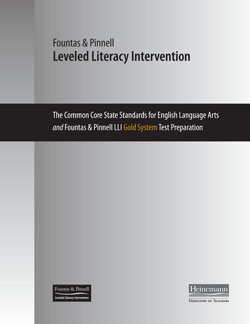LLI Research Base and Efficacy Study Reports
Irene C. Fountas and Gay Su Pinnell are committed to the important role of research on reading in the ongoing development and evaluation of Leveled Literacy Intervention (LLI). Find the latest research and efficacy on LLI below.
Research
Research Base
Leveled Literacy Intervention, Grades K–2 (Levels A–N)
The development of LLI was driven by what prior research has established about how children learn to read, and what works best with struggling readers. Please refer to the research base for more information regarding the background research that provided the foundation for the development of this intervention system.
LLI Research Base
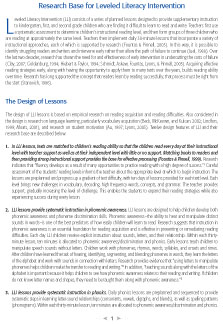
Leveled Literacy Intervention, Grades 3–5+ (Levels L–W)
In this summary, Irene Fountas and Gay Su Pinnell review the research base for the Red, Gold, and Purple systems of Leveled Literacy Intervention, which is designed to lift the literacy achievement of students who are falling below grade level expectations in reading. The 15 principles on which the LLI Red, Gold, and Purple systems are based are discussed, along with a list of supporting research. The lesson framework for the extended systems of LLI rests on these principles.
LLI Research Base Summary Grades 3 to 5+
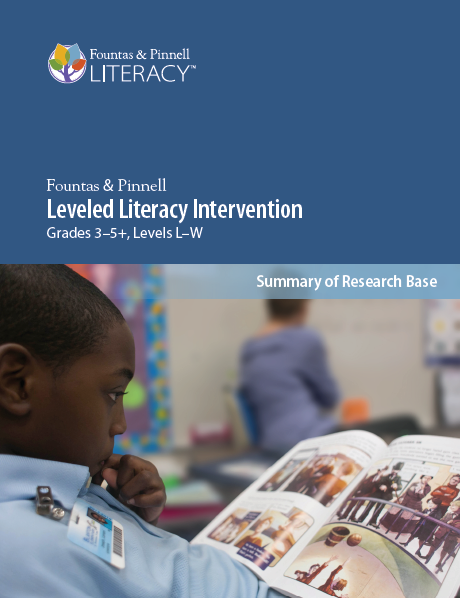
Independent Organizational Research
The What Works Clearinghouse LLI Effectiveness Study
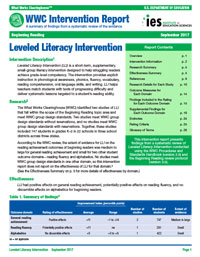
The What Works Clearinghouse and the National Center for Education Evaluation and Regional Assistance (NCEE) found Fountas & Pinnell Leveled Literacy Intervention to have a positive effect on general reading achievement and reading fluency based on a comprehensive review of available evidence.
In the General Reading Achievement domain, the research indicated strong evidence of a positive effect with no overriding contrary evidence. In the two studies that reported findings, the estimated impact of LLI on outcomes in the general reading achievement domain was positive and statistically significant for two studies, both of which meet WWC group design standards without reservations. The extent of the available evidence is medium to large and included 747 students in 22 schools.
In the Reading Fluency domain, the research indicated evidence of a positive effect with no overriding contrary evidence.
In the one study that reported findings, the estimated impact of LLI on outcomes in the reading fluency domain was statistically significant and substantively important. This study included 281 students in nine schools.
Read the Report »
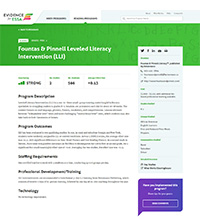 Evidence for ESSA review of LLI K–2
Evidence for ESSA review of LLI K–2
ESSA has reviewed the research on LLI, finding strong evidence of effectiveness for students in grades K-2. These findings are based on two independent, empirical studies conducted by The University of Memphis’s Center for Research in Educational Policy (CREP).
Read the Report »
Research connected with the Development of LLI
During the development of LLI, a field study was conducted at sites around the United States to assess the LLI framework. Please refer to the field study for more information about the field study and the research connected with the development of LLI.
LLI Research Field Study Results and Participants
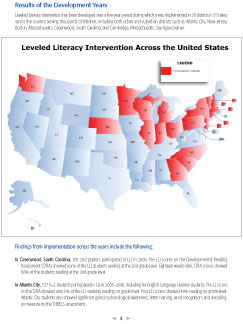
Additionally, the student data from three of the sites that participated in the field study (Newark OH, Boston MA and Manchester NH) was analyzed for a pilot research project that examined student progress. Please refer to the pilot study, for the results from this study.
LLI Research Reading Gains for Students in Pilot Program
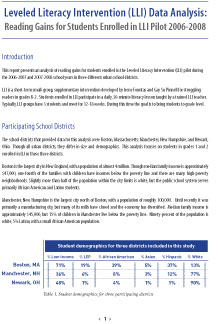
This report presents an analysis of reading gains for students enrolled in the Leveled Literacy Intervention (LLI) pilot during the 2006-2007 and 2007-2008 school years in three different urban school districts.
Standards
The Common Core State Standards Alignment for Leveled Literacy Intervention
Efficacy
LLI K-2 Efficacy Studies
LLI Efficacy Study 2011-2012–urban schools
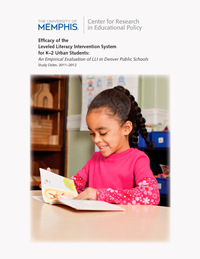
An additional independent LLI Efficacy Study was conducted by the Center for Research in Education Policy (CREP) at the University of Memphis examining the efficacy of LLI instruction on struggling readers in urban districts in Denver, Colorado. A total of 320 K–2 students participated in this mixed-methods randomized controlled trial (RCT) that included both quantitative and qualitative data. The students were matched demographically and randomly assigned to treatment and control groups. There were four key purposes of this study: (1) to determine the efficacy of the Leveled Literacy Intervention System (LLI) in increasing literacy achievement for urban K–2 students and associated student subgroups; (2) to examine LLI System implementation fidelity in urban settings; (3) to determine perceptions of the LLI System according to relevant stakeholders; and (4) to corroborate the Fountas & Pinnell Benchmark Assessment System with established literacy assessments (i.e., the Developmental Reading Assessment, 2nd Edition [DRA2] and the STAR Early Literacy Assessment).
Review the LLI Efficacy 2011-2012 Denver Study »Read the Executive Summary of this study »
LLI Efficacy Study 2012
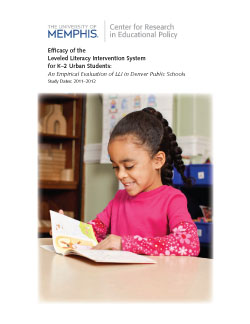
This report summarizes the results of an efficacy study of the Leveled Literacy Intervention system (LLI) conducted by the Center for Research in Educational Policy (CREP) in Denver Public Schools (DPS) during the 2011-2012 school year.
LLI Efficacy Executive Summary 2013
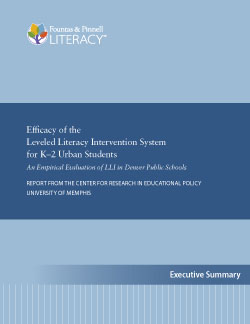
This report summarizes the results of an efficacy study of the Leveled Literacy Intervention system (LLI) conducted by the Center for Research in Educational Policy (CREP) in Denver Public Schools (DPS) during the 2011–2012 school year.
Independent Gold Standard LLI Efficacy Study 2009-2010–rural and suburban schools
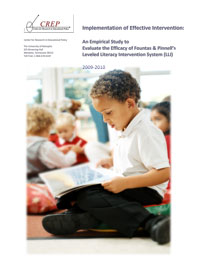
The LLI Efficacy Study was conducted by an independent research group, the Center for Research in Education Policy (CREP) at the University of Memphis. This scientific study looked at the impact of LLI instruction on struggling readers in two locations: the rural Tifton County Schools in GA and the suburban Enlarged School District of Middletown, NY. The LLI Efficacy study employed a randomized controlled trial, mixed-methods design and included both quantitative and qualitative data. Students were randomly selected for the treatment or control groups. A matched-pair design was used to ensure equivalency between treatment and control groups, and pre-post comparisons of student achievement in literacy were conducted. In addition, the study looked at the fidelity of LLI implementation. It included both independent observations and feedback from teachers and independent on-site researchers. These included two measures of reading achievement for evaluating students' progress in literacy; one observational tool for assessing teachers' LLI instructional practices; and two teacher surveys and focus groups to obtain teachers' and on-site researchers' feedback on LLI .
Review the LLI Efficacy Study »Read the Executive Summary of this study »
LLI Efficacy Study 2010
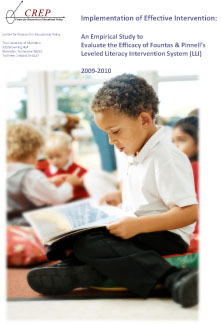
This report summarizes evaluation results for an efficacy study of the Leveled Literacy Intervention system (LLI) implemented in Tift County Schools (TCS) in Georgia and the Enlarged City School District of Middletown (ECSDM) in New York during the 2009-2010 school year.
LLI Efficacy Executive Summary 2010
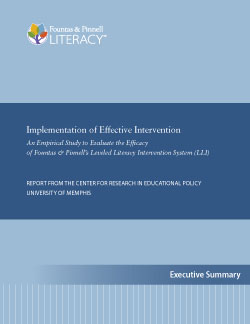
This report summarizes evaluation results for an efficacy study of the Leveled Literacy Intervention system (LLI) implemented in Tift County Schools (TCS) in Georgia and the Enlarged City School District of Middletown (ECSDM) in New York during the 2009-2010 school year.
LLI 3-5 Efficacy Studies
LLI Grades 3-5 Efficacy Study – Abilene Independent School District
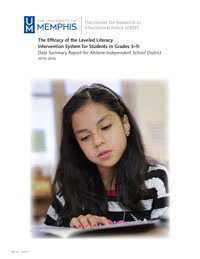
An independent research group, the Center for Research in Education Policy (CREP) at the University of Memphis conducted three separate studies evaluating the efficacy of Leveled Literacy Intervention (LLI) for students in grades 3-5 during the 2015-2016 school year. This report summarizes their findings for students in the Abilene Independent School District in Abilene, TX. A total of 548 students participated in this study, which used a mixed-methods design and included both quantitative and qualitative data. The students were matched demographically and assigned to treatment and control groups. There were three key purposes of this study: (1) to determine the efficacy of LLI in increasing literacy achievement for students in grades 3-5 and associated student subgroups; (2) to examine LLI program implementation fidelity in grades 3-5; and (3) to determine perceptions of the LLI system according to relevant stakeholders.
Review the Study »LLI Grades 3-5 Efficacy Study – Abilene Independent School District
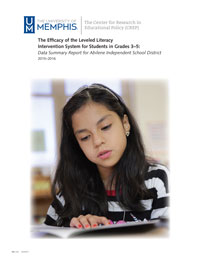
This report summarizes the results of an efficacy study of the Leveled Literacy Intervention system (LLI) for students in Grades 3-5 conducted by the Center for Research in Educational Policy (CREP) in Abilene Independent School District (AISD) during the 2015-2016 school year.
LLI Grades 3-5 Efficacy Study – Denver Public Schools
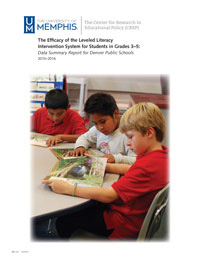
An independent research group, the Center for Research in Education Policy (CREP) at the University of Memphis conducted three separate studies evaluating the efficacy of Leveled Literacy Intervention (LLI) for students in grades 3-5 during the 2015-2016 school year. This report summarizes the findings for students in Denver Public Schools in Denver, CO. A total of 115 students participated in this study, which used a mixed-methods design and included both quantitative and qualitative data. The students were matched demographically and assigned to treatment and control groups. There were three key purposes of this study: (1) to determine the efficacy of LLI in increasing literacy achievement for students in grades 3-5 and associated student subgroups; (2) to examine LLI program implementation fidelity in grades 3-5; and (3) to determine perceptions of the LLI system according to relevant stakeholders.
Review the Study »LLI Grades 3-5 Efficacy Study – Denver Public Schools
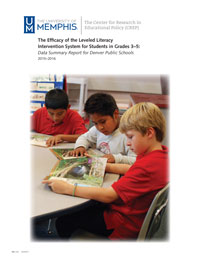
This report summarizes the results of an efficacy study of the Leveled Literacy Intervention system (LLI) for students in Grades 3-5 conducted by the Center for Research in Educational Policy (CREP) in Denver Public Schools (DPS) during the 2015-2016 school year.
LLI Grades 3-5 Efficacy Study – Sandwich Public Schools
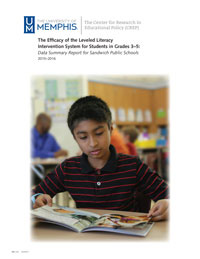
An independent research group, the Center for Research in Education Policy (CREP) at the University of Memphis conduced three separate studies evaluating the efficacy of Leveled Literacy Intervention (LLI) for students in grades 3-5 during the 2015-2016 school year. This report summarizes the findings for students in Sandwich Public Schools in Sandwich, MA. A total of 105 students participated in this study, which used a mixed-methods design and included both quantitative and qualitative data. The students were matched demographically and assigned to treatment and control groups. There were three key purposes of this study: (1) to determine the efficacy of LLI in increasing literacy achievement for students in grades 305 and associated student subgroups; (2) to examine LLI program implementation fidelity in grades 3-5; and (3) to determine perceptions of the LLI system according to relevant stakeholders.
Review the Study »LLI Grades 3-5 Efficacy Study – Sandwich Public Schools
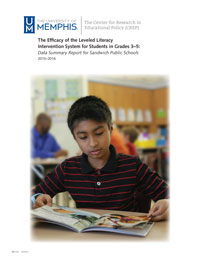
This report summarizes the results of an efficacy study of the Leveled Literacy Intervention system (LLI) for students in Grades 3-5 conducted by the Center for Research in Educational Policy (CREP) in Sandwich Public Schools (SPS) during the 2015-2016 school year.
Heinemann LLI Research and Data Collection Project
2009/2010
The Heinemann LLI Data Collection Project was conducted by Liz Ward, Ph.D., a researcher working for Heinemann under the direction of Irene Fountas and Gay Su Pinnell. This study was descriptive and described reading gains for students enrolled in the Leveled Literacy Intervention (LLI) System at 34 sites around the United States and Canada. Individual data forms reporting on student demographics, teacher experience, implementation parameters, and performance data for LLI students were completed by LLI teachers, collected at the district level, and sent to the researcher conducting the study. Each student's reading progress was determined by looking at their pre- and post-LLI instructional reading levels (ranging from Pre-A to Z), which were based on the F&P Text Level Gradient™. The instructional reading levels were obtained through the teachers' reports of their students' instructional reading levels, which were determined by administration of the Fountas & Pinnell Benchmark Assessment System or reading records or by the conversion to F&P levels on the teacher's reports of their students' score on other assessments including the DRA or DRA2, the Reading Recovery Observation Survey with Running Records, the Rigby Benchmark, and other reading assessments. The data were collected and reported for LLI students only. No control group was identified and assessed and therefore, the LLI student growth was compared to Fountas and Pinnell grade-level criteria for satisfactory progress.
Read the Executive Summary of this project here »LLI Research and Data Collection Project Report
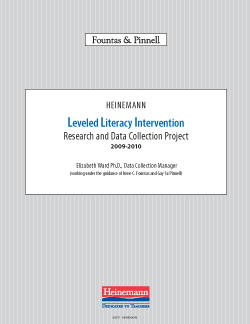
This report summarizes the results of a descriptive study of Leveled Literacy Intervention (LLI) that took place during the 2009-10 school year.
Reading Progress for Special Education LLI students
Heinemann's LLI Data Collection Project (2009-2010) included 824 kindergarten through fifth-grade students with an IEP for Reading or other categories (SPED). With Leveled Literacy Intervention these students made an average of seven and a half months of progress in a little more than four and a half months.
Read a summary of these results here »LLI Research Reading Progress for Special Education
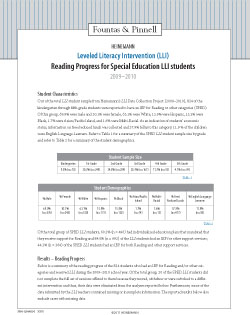
This is a summary of the reading progress of the 824 kindergarten through fifth-grade students who had an IEP for Reading and/or other categories (SPED) and received LLI during Heinemann’s 2009–2010 LLI Data Collection Project.
Reading Progress for English language learner LLI students
Out of the total LLI student sample from Heinemann's LLI Data Collection Project (2009-2010), 925 of the kindergarten through fifth-grade students were reported to be English language learners (ELL). Learn how the reading progress of these English language learners accelerated in LLI in the summary report.
LLI Research Reading Progress for ELL
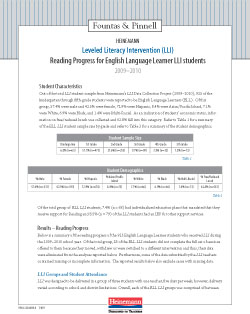
This is a summary of the reading progress of the 925 kindergarten through fifth-grade students who were English Language Learners (ELL) and received LLI during Heinemann’s 2009–2010 LLI Data Collection Project.
LLI Data Collection Project Report 2009-2010 - Abby Kelley Foster Charter School MA
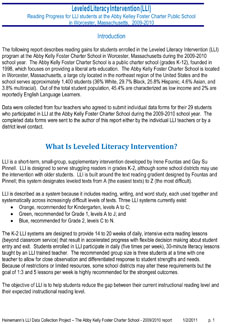
Asheboro City Schools NC
LLI Data Collection Project Report 2009-2010 - Asheboro City Schools NC
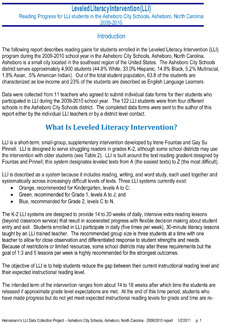
Barrington IL
LLI Data Collection Project Report 2009-2010 - Barrington IL
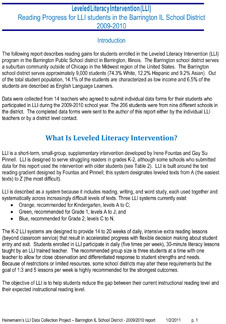
Bloomfield IN
LLI Data Collection Project Report 2009-2010 - Bloomfield IN
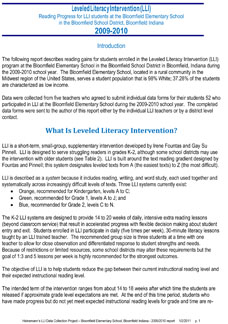
Branksome Hall CAN
LLI Data Collection Project Report 2009-2010 - Branksome Hall Toronto Canada
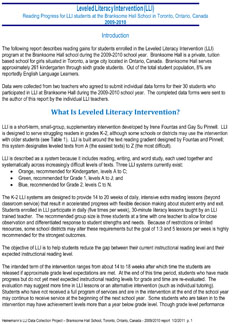
Bristol Public Schools
LLI Data Collection Project Report 2009-2010 - Bristol Public Schools
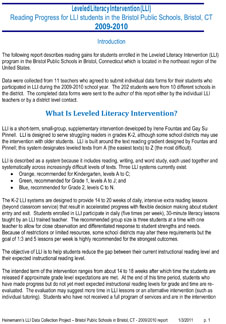
Brunswick ME
LLI Data Collection Project Report 2009-2010 - Brunswick ME
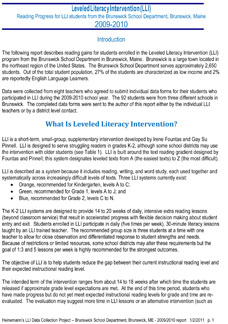
The following report describes reading gains for students enrolled in the Leveled Literacy Intervention (LLI) program from the Brunswick School Department in Brunswick, Maine.
Buncombe County Schools NC
LLI Data Collection Project Report 2009-2010 - Buncombe County Schools NC
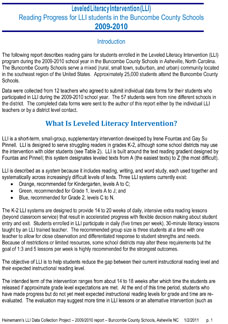
The following report describes reading gains for students enrolled in the Leveled Literacy Intervention (LLI) program during the 2009-2010 school year in the Buncombe County Schools in Asheville, North Carolina.
Cambridge MA
LLI Data Collection Project Report 2009-2010 - Cambridge MA
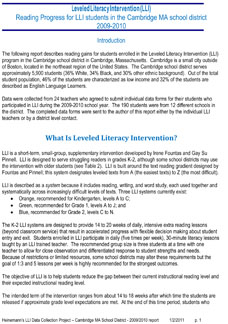
The following report describes reading gains for students enrolled in the Leveled Literacy Intervention (LLI) program in the Cambridge school district in Cambridge, Massachusetts.
Dalton Public Schools GA
LLI Data Collection Project Report 2009-2010 - Dalton Public Schools GA
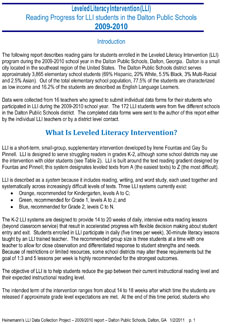
The following report describes reading gains for students enrolled in the Leveled Literacy Intervention (LLI) program during the 2009-2010 school year in the Dalton Public Schools, Dalton, Georgia.
Denver Public Schools CO
LLI Data Collection Project Report 2009-2010 - Denver Public Schools CO
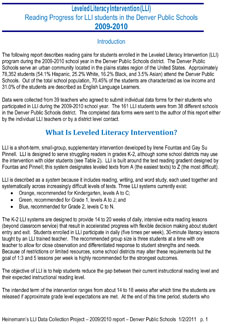
The following report describes reading gains for students enrolled in the Leveled Literacy Intervention (LLI) program during the 2009-2010 school year in the Denver Public Schools district.
District Southeast Region US
LLI Data Collection Project Report 2009-2010 - District Southeast Region US
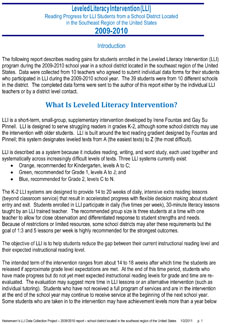
The following report describes reading gains for students enrolled in the Leveled Literacy Intervention (LLI) program during the 2009-2010 school year in a school district located in the southeast region of the United States.
District Mixed Rural Suburban Northeast Region US
LLI Data Collection Project Report 2009-2010 - District Mixed Rural Suburban Northeast Region US
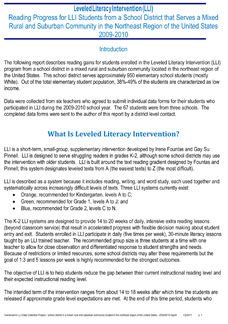
The following report describes reading gains for students enrolled in the Leveled Literacy Intervention (LLI) program from a school district in a mixed rural and suburban community located in the northeast region of the United States.
East Central Vermont Literacy Consortium
LLI Data Collection Project Report 2009-2010 - East Central Vermont Literacy Consortium
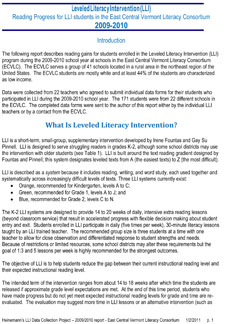
The following report describes reading gains for students enrolled in the Leveled Literacy Intervention (LLI) program during the 2009-2010 school year at schools in the East Central Vermont Literacy Consortium (ECVLC).
Enlarged City School District of Middletown NY
LLI Data Collection Project Report 2009-2010 - School District of Middletown NY
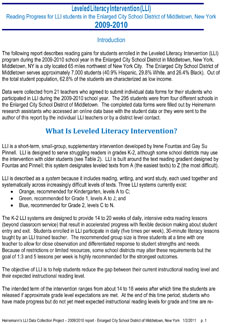
The following report describes reading gains for students enrolled in the Leveled Literacy Intervention (LLI) program during the 2009-2010 school year in the Enlarged City School District in Middletown, New York.
Ephesus Road Elementary School Chapel Hill NC
LLI Data Collection Project Report 2009-2010 - Ephesus Road Elementary School Chapel Hill NC
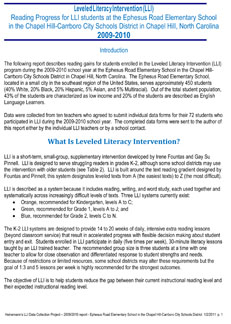
The following report describes reading gains for students enrolled in the Leveled Literacy Intervention (LLI) program during the 2009-2010 school year at the Ephesus Road Elementary School in the Chapel Hill-Carrboro City Schools District in Chapel Hill, North Carolina.
Farmington CT
LLI Data Collection Project Report 2009-2010 - Farmington CT
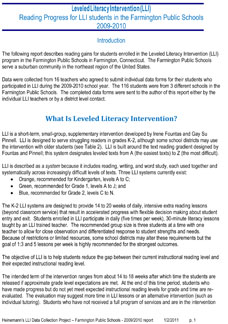
The following report describes reading gains for students enrolled in the Leveled Literacy Intervention (LLI) program in the Farmington Public Schools in Farmington, Connecticut.
Fort Fairfield Elementary - MSAD 20 - ME
LLI Data Collection Project Report 2009-2010 - Fort Fairfield Elementary - MSAD 20 - ME
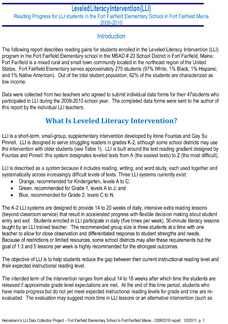
The following report describes reading gains for students enrolled in the Leveled Literacy Intervention (LLI) program in the Fort Fairfield Elementary school in the MSAD # 20 School District in Fort Fairfield, Maine.
High Prairie Elementary School Canada
LLI Data Collection Project Report 2009-2010 - High Prairie Elementary School Canada
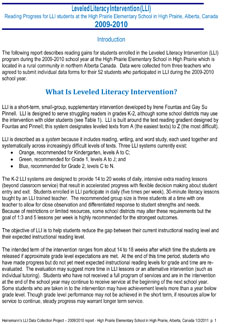
The following report describes reading gains for students enrolled in the Leveled Literacy Intervention (LLI) program during the 2009-2010 school year at the High Prairie Elementary School in High Prairie which is located in a rural community in northern Alberta Canada.
Imagine Rosefield Elementary School Surprise AZ
LLI Data Collection Project Report 2009-2010 - Imagine Rosefield Elementary School Surprise AZ
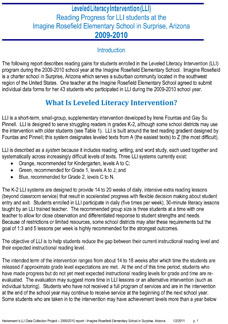
The following report describes reading gains for students enrolled in the Leveled Literacy Intervention (LLI) program during the 2009-2010 school year at the Imagine Rosefield Elementary School, which is a charter school in Surprise, Arizona.
Large, Suburban District in Southeast Texas
LLI Data Collection Project Report 2009-2010 - Large, Suburban District in Southeast Texas
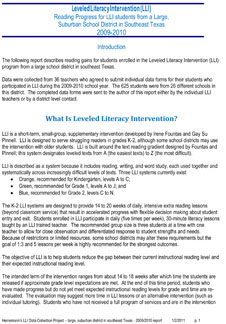
Lincoln Public Schools
LLI Data Collection Project Report 2009-2010 - Lincoln Public Schools
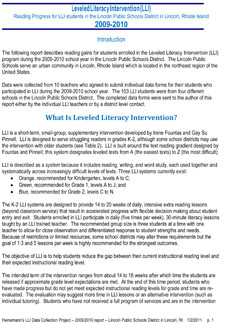
The following report describes reading gains for students enrolled in the Leveled Literacy Intervention (LLI) program during the 2009-2010 school year in the Lincoln Public Schools District. The Lincoln Public Schools serve an urban community in Lincoln, Rhode Island which is located in the northeast region of the United States.
Luther Low Elementary School in West Middlesex PA
LLI Data Collection Project Report 2009-2010 - Luther Low Elementary School in West Middlesex PA
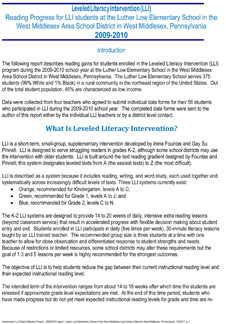
The following report describes reading gains for students enrolled in the Leveled Literacy Intervention (LLI) program during the 2009-2010 school year at the Luther Low Elementary School in the West Middlesex Area School District in West Middlesex, Pennsylvania.
Manchester NH
LLI Data Collection Project Report 2009-2010 - Manchester NH
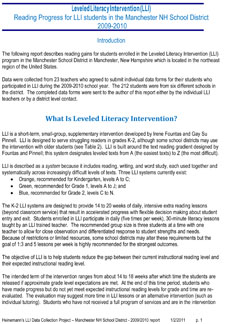
The following report describes reading gains for students enrolled in the Leveled Literacy Intervention (LLI) program in the Manchester School District in Manchester, New Hampshire.
Monroe Public Schools MI
LLI Data Collection Project Report 2009-2010 - Monroe Public Schools MI
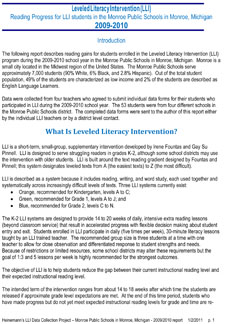
The following report describes reading gains for students enrolled in the Leveled Literacy Intervention (LLI) program during the 2009-2010 school year in the Monroe Public Schools in Monroe, Michigan.
Newark City Schools OH
LLI Data Collection Project Report 2009-2010 - Newark City Schools OH
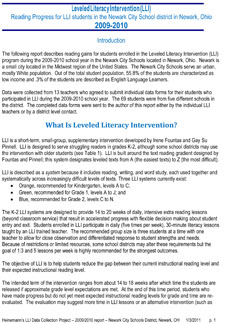
The following report describes reading gains for students enrolled in the Leveled Literacy Intervention (LLI) program during the 2009-2010 school year in the Newark City Schools located in Newark, Ohio.
Northwest VT Reading Recovery Consortium
LLI Data Collection Project Report 2009-2010 - Northwest VT Reading Recovery Consortium
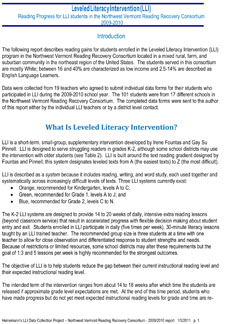
The following report describes reading gains for students enrolled in the Leveled Literacy Intervention (LLI) program in the Northwest Vermont Reading Recovery Consortium located in a mixed rural, farm, and suburban community in the northeast region of the United States.
School Board in Mixed Small Town and Rural Community Located in Nova Scotia, Canada
LLI Data Collection Project Report 2009-2010 - School Board in Mixed Small Town and Rural Community Located in Nova Scotia, Canada
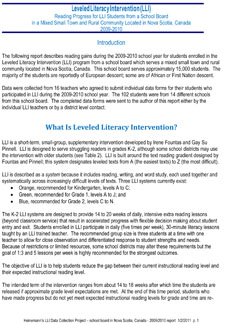
School in a Mixed Suburban and Urban Community in the Southeast Region of the United States
LLI Data Collection Project Report 2009-2010 - School in a Mixed Suburban and Urban Community in the Southeast Region of the United States
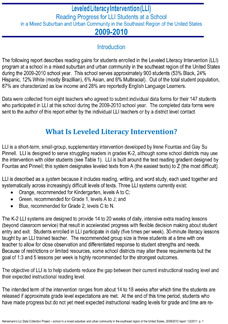
The following report describes reading gains for students enrolled in the Leveled Literacy Intervention (LLI) program at a school in a mixed suburban and urban community in the southeast region of the United States during the 2009-2010 school year.
School in an Urban Community in the Northeast Region of the United States
LLI Data Collection Project Report 2009-2010 - School in an Urban Community in the Northeast Region of the United States
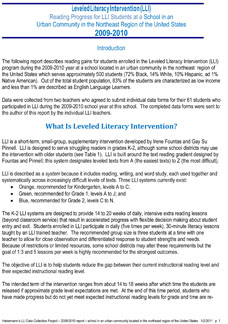
The following report describes reading gains for students enrolled in the Leveled Literacy Intervention (LLI) program during the 2009-2010 year at a school located in an urban community in the northeast region of the United States.
Sunnyside Elementary IN
LLI Data Collection Project Report 2009-2010 - Sunnyside Elementary IN
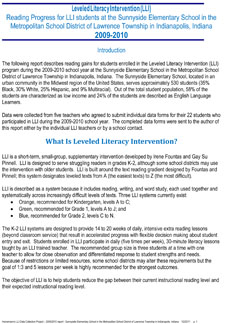
The following report describes reading gains for students enrolled in the Leveled Literacy Intervention (LLI) program during the 2009-2010 school year at the Sunnyside Elementary School in the Metropolitan School District of Lawrence Township in Indianapolis, Indiana.
Urban Community in the Northeast Region of US
LLI Data Collection Project Report 2009-2010 - Urban Community in the Northeast Region of US
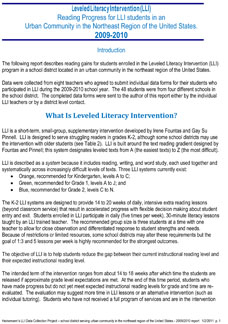
The following report describes reading gains for students enrolled in the Leveled Literacy Intervention (LLI) program in a school district located in an urban community in the northeast region of the United States.
Washington County MD
LLI Data Collection Project Report 2009-2010 - Washington County MD
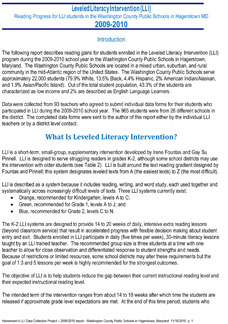
The following report describes reading gains for students enrolled in the Leveled Literacy Intervention (LLI) program during the 2009-2010 school year in the Washington County Public Schools in Hagerstown, Maryland.
Woodview Elementary School IN
LLI Data Collection Project Report 2009-2010 - Woodview Elementary School IN
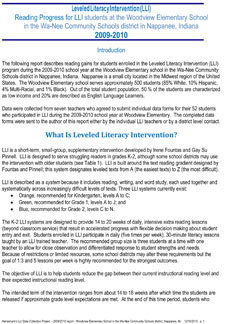
The following report describes reading gains for students enrolled in the Leveled Literacy Intervention (LLI) program during the 2009-2010 school year at the Woodview Elementary school in the Wa-Nee Community Schools district in Nappanee, Indiana.
2010/2011
Read about the continuing use of LLI in the second report documenting Heinemann's own Research and Data Collection Project. This report analyzes data collected during 2010-2011 school year. Over 2,600 students from 114 schools from 11 states participated in this study. Results show on average a time equivalent gain in reading level of about 9 months after just 4.5 months of LLI instruction.
Read the Executive Summary of this project here »LLI Research and Data Collection Project Full Report
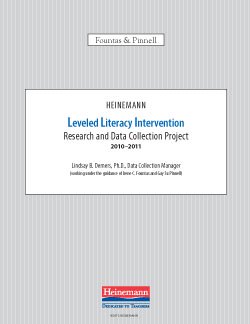
This report describes the results of a correlational study of Leveled Literacy Intervention (LLI) that took place during the 2010–11 school year.


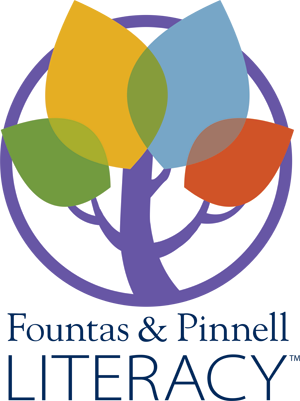

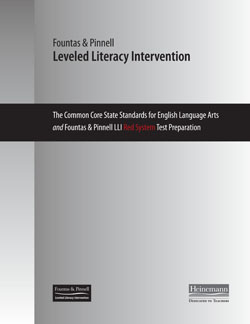
 The full version of this resource requires registration.
The full version of this resource requires registration.
